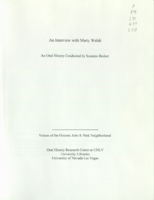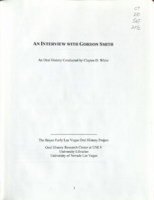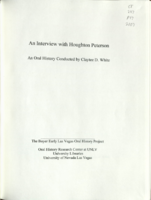Search the Special Collections and Archives Portal
Search Results

Transcript of interview with Danny Lee by Claytee White and Stefani Evans, May 23, 2016
Date
Archival Collection
Description
Folks who graduated Boulder City High School in 1953 and who began kindergarten there might remember being in kindergarten class with Clark D. "Danny" Lee. They would be excused for not remembering the towheaded Lee; after all, he was in Boulder City only for the first half of the year. They also would be excused for not remembering Lee because he never stayed in school once he arrived. Danny was the child whose mother faithfully brought him to class every day. And every day, as soon as his mother dropped him off, he took off and beat his mother home. Danny Lee was born in his grandparents’ house in North Las Vegas, grew up on 10 Bonneville Street, and (except for his first semester of kindergarten in Boulder City) attended Fifth Street Elementary School and Las Vegas High School, where he graduated in 1953 with Rex Bell. In 1960 he married fellow Las Vegas High grad and former Rhythmette, Dorothy Damron; they have raised four children. Here, Lee talks about the difficulties his father had finding work and supporting a family during the Great Depression-of living with relatives and moving from place to place in the small travel trailer as his father found work. He describes a hardscrabble Las Vegas, where he and other kids in in multiethnic groups found temporary work helping drovers in the stockyards or filling blocks of ice in the icehouse. He recalls working for Superior Tire during high school and for the Union Pacific Railroad in a variety of jobs after graduation and the U.S. Army-including a stint as a Union Pacific tour director. v Lee’s early kindergarten career seems an unlikely academic indicator for a man who would spend most of his adult life volunteering for and lobbying on behalf of Clark County public libraries and who the American Library Association would select as the 1990 Library Trustee of the Year. Ironically, Lee was asked to serve on the Clark County Library District board of directors to get rid of a troublesome library director. Instead, he became one of the director’s staunchest advocates. It is appropriate that Danny and his wife, Dorothy, are pictured here surrounded by library books. The native Las Vegan built a lifetime career as a State Farm Insurance salesman, but in this interview he focuses on his public library advocacy, his time as trustee for the Clark County Library District; the formation of the Las Vegas-Clark County Library District; the ambitious building program funded by $80 million in voter-approved statewide bonds; and the political wrangling in Carson City necessary to achieve these ends. Lee’s oral history complements that of his wife, Dorothy Lee, and of Charles Hunsberger, who was the “troublesome” library director at the time Lee was trustee. Lee made his living as an insurance salesman. Lee’s ability to sell a product-whether it be insurance or an $80 million bond issue-is the attribute that made Danny Lee so valuable as a trustee to the Las Vegas-Clark County Library District and consequently, to all Clark County residents who value public library services. However, his passion, and dedication, and unbowed determination earned him the Library Trustee of the Year award. As Lee closes the interview, he locks eyes with Dorothy and muses, "Let me tell you what I'm most proud of in all . . . I've been married to this lady for fifty six years now. . . . I've lived a very blessed life. Being born in my grandmother's house and having lived in little travel trailers, it's just good. It's worked. We're living like we've always wanted to live right now."
Text

James Dean Leavitt oral history interviews: transcript
Date
Archival Collection
Description
Oral history interviews with James Dean Leavitt conducted by Claytee D. White on September 27 and October 4, 2022 for the Boyer Early Las Vegas Oral History Project. In this interview, Leavitt recalls his role in establishing a medical school at the University of Nevada, Las Vegas (UNLV), now known as Kirk Kerkorian School of Medicine. Leavitt was elected to the Board of Regents in 2004 while Jim Rogers was interim Chancellor of the Nevada System of Higher Education (NSHE), and he suggested the creation of an ad hoc committee Health Science Center Committee. In 2009, Leavitt became Chairman of the Board of Regents, Dan Klaich became Chancellor, and in the following year, Dr. Mark Doubrava joined the board. In May 2014, the planning dean was hired, Dr. Barbara Atkinson, and the UNLV School of Medicine was officially established on August 22, 2014.
Text

Transcript of interview with Marty Walsh by Suzanne Becker, July 19, 2007
Date
Archival Collection
Description
In 2002, Marty Walsh and her husband purchased a home in the John S. Park Neighborhood. Three aspects attracted them to their 1941-built home: the quality construction; the aesthetics and details of the house; and the "old-fashion human element" that she associated with her grandparents. Marty describes their relocation to Las Vegas after living for nine years in Ireland and her joy of discovering the John S. Park community. For her there is a neighborliness that they found in the form of the Neighborhood Watch. She feels the neighborhood still has work to do, but the gentrification has had splendid results as new "urbanites" replace original homeowners. From her artist point of view, she also provides thoughts about the impact the artist community of musicians, painters, and creative artists has had on the neighborhood. Even though she is relatively new to Las Vegas, she is well researched in the historic aspects of John S. Park location: once a fertile plot of land where
Text

Transcript of interview with Gordon Smith by Claytee White, January 29, 2013
Date
Archival Collection
Description
Gordon Smith was born in Utah, but moved with his family to Babbitt, Nevada in 1947. His father, a barber, moved the family to Las Vegas in 1955. In this interview, Gordon recalls school and after-school pursuits; changes in the town; summer jobs; and college. He also talks about his military service and returning to Las Vegas to take up the razor himself - starting a successful barbering business of over 30 years.
Text

Transcript of interview with Rabbi Sanford Akselrad by Barbara Tabach, October 29, 2014
Date
Archival Collection
Description
Sanford Akselrad is the rabbi at Congregation Ner Tamid. In this interview he describes his rabbinical training, coming to Las Vegas, and the growth of the congregation.
More inclined in his youth to pursue a career as a scientist than rabbi, Sanford Akselrad (1957- ) became the rabbi at Congregation Ner Tamid in 1988. Turning his tenure, Rabbi Akselrad has lead the congregation through its move from Emerson to Street to its permanent home on Green Valley Parkway and I-215 and shares a fun story about buying desks and chairs from the Clark County School District. He talks about many of the milestones including: Project Ezra which he started during the 2008 recession to help Jewish community members find jobs; the NextGen program which was initiated to bring young adults in their twenties and thirties back to the temple. For over twenty years Rabbi Akselrad was a member of the board of the Nevada Governor?s Council on Holocaust education, a topic that was the focus of his rabbinical thesis. He was the founding president of the Clark County Board of Rabbis and has served on the boards of the Jewish Federation of Las Vegas, Jewish Family Services, and the Humana Hospital Pastoral Advisory Board. He was also the chair of the Federation?s Community Relations Council (CRC). Rabbi Akselrad is a board member of the Anti-Defamation League Nevada region office and the Interfaith Council of Southern Nevada. Sanford Akselrad was born on October 6, 1957 in Oakland, California and raised in Palo Alto. He attended the University of California, Los Angeles and then went to graduate school at the Hebrew Union College Jewish Institute of Religion. He spent the first year of his graduate program in Israel, the next two in Los Angeles, and the final two years in Cincinnati, Ohio. Rabbi Akselrad met his wife Joni in Reno, Nevada and married her during his third year of rabbinical school. The couple has two children, CJ and Sam. After his ordination in 1984, Rabbi Akselrad was associate rabbi of Temple Israel in Columbus, Ohio, one of the largest Reform congregations in the Midwest. His choice of career was inspired by his father, Sidney Akselrad, who was a prominent rabbi involved in social justice issues and the Civil Rights Movement. Sanford Akselrad has followed his father?s example of community involvement, both in Las Vegas and on a national level: he served on the board of the National Conference of Community and Justice (NCJJ), he was chair of the NCJJ's Inter-faith Council, and he is active in the Union of Reform Judaism (URJ).
Text

Guadalupe Meza Redmond interview, December 7, 2018: transcript
Date
Archival Collection
Description
Interviewed by Claytee White. Rodrigo Vazquez also participated in the questioning. Guadalupe Redmond lived a wonderful life in Mexico while growing up. When Guadalupe was 17, her mother decided to immigrate the family to Las Vegas, Nevada, Guadalupe did not want to move but reluctantly did so. She taught herself English by watching TV. Then she decided she wanted to work and became a guest room attendant working downtown and on the Strip - Sundance (Fitzgerald's, now the D), Stratosphere, Aladdin, Planet Hollywood, Riviera, Hacienda - to name a few. As she moved about, she began to understand the importance of the Culinary Union Local 226. She is now an organizer who in 1989 participated in a 10-month Work and Walk strategy that was successful.
Text

Transcript of interview with Linda Lintner by Claytee White, February 12, 2013
Date
Archival Collection
Description
The daughter of a soldier, Linda Lintner and her mother traveled from North Carolina to Overton, Nevada to stay with Linda's grandparents when she was only six weeks old. After her father joined the family, they moved to Las Vegas where both her mother and her father started working at the Post Office. Linda attended local elementary and middle schools in the valley, and in due time, Rancho High School. In this interview, Linda shares not only her memories of growing up in Las Vegas but also fascinating stories about the almost decade long round the world sailing journey that she and her second husband began in 1986. In the course of the decade, Linda became a qualified diver, and expert sailor, and developed a lasting appreciation for the world, its oceans - and the skills you learn when you live on a boat with one other person for so very long. Since their return, Linda has been keeping busy, volunteering many hours with local veterans homes and the church - we are fortunate that she was able to spend time with our interviewer, too, to share her memories of growing up in Las Vegas.
Text

Transcript of interview with Kim Bird & Pam Fogliasso by Claytee D. White, February 8, 2013
Date
Archival Collection
Description
Kim Bird's family moved to Las Vegas in 1955 when she was twelve years old. Pam Fogliasso arrived in 1954 with her family in 1954, when she was ten. Kim married and had a son and a daughter; she lives in Las Vegas. Pam married, had two children, and lives in Parumph, Nevada. Though Kim and Pam moved here in the mid-1950s, they had family members who had lived in Southern Nevada and worked on building Hoover Dam - Kim's grandfather and Pam's great-uncle. Both women remember growing up in a Las Vegas that was run by the mob and safe for teenagers; meeting friends in local hangouts such as the Blue Onion and attending sock hops, babysitting, and cruising down Fremont Street. They attended high school with black students but were also aware of the segregation that existed on the Strip. This interview focuses on Kim and Pam's experiences growing up in Las Vegas, and on their teenaged years attending Rancho High School.
Text

Transcript of interview with Audrey Wickman by Joanne Goodwin, June 24, 1996
Date
Archival Collection
Description
Born in the coal fields of Strunk, Kentucky, Audrey Aline Messer Wickman first visited the West at twelve years of age. She moved to western Colorado to help in her grandparents’ home for a couple of years. The stay made a lasting impression because she only returned to her birthplace for a short time after that. In Colorado, she graduated from high school, met her future husband, and married in 1925. They came to southern Nevada in 1932 so that Robert Wickman could find work on Hoover Dam. Audrey Wickman joined the Mesquite Club in 1936 and has remained a member to date. She started the Literary Committee as a forum to share book reviews and hear speakers. She served as President of the club for 1947-48 and chose the year’s theme “Know your Neighbor.” In the post-war society, women’s involvement in civic affairs was particularly needed, she told the membership at the opening fall meeting. “The troubles which unsettle the world today are primarily ones which lie within the sphere of women’s business. They are matters of housekeeping, teaching and health. . . . The time has come when we as a nation cannot stay in our own backyards. . . . If we are to be good world citizens, local, state and national, we must first be good home citizens. These responsibilities call for knowledge, an appreciation of other points of view, and attitudes of good will and cooperation.” (Las Vegas Review Journal, 6 October 1947, Mesquite Club microfilm collection.) The duties of the president varied during those years. She recalled that “I was janitor, gardener and President.” During the wintertime, she remembered, “you had to have heat [for Friday’s meeting] and I’d go up on Thursday afternoon and light that old oil burning stove and then pray that it didn’t catch the place on fire all night.” She continued her commitment to club work by serving as state secretary for the Nevada Federation of Women’s Clubs. The friendships and cultural events which came from Mesquite Club and Federation membership proved to be of lasting value for this community builder. This interview has been produced with the assistance of the Mesquite Club and the History Department of the University of Nevada, Las Vegas. It is part of a series on women community builders in Las Vegas. The transcript has been edited only slightly for clarity while the syntax and style of the narrator were retained.
Text

Transcript of interview with Houghton Hoot Peterson by Claytee White, May 20, 2010
Date
Archival Collection
Description
Houghton Hoot Peterson played trombone in his high school band in northern Minnesota where he grew up. That same instrument would lead him to be a member of the highly regarded Air Force jazz band called Airmen of Note after enlistment. Then during a short tour at Nellis Air Force base, Hoot decided that the Las Vegas entertainment scene might have career opportunities for him. He moved to Las Vegas in 1962, an era of celebrity performers and tourists who enjoyed the crowds and nightlife. Hoot's point of view was as a musician in the band, most often a Strip relief band. But he also has tales of famous musicians and late night jam sessions. Hoot's career spanned 20 years. Eventually the Las Vegas scene for live musicians began to change. When times got tough for Hoot, he worked as a carpenter and at a music store. In this interview he discusses his fascinating past and offers advice for today's musicians.
Text
